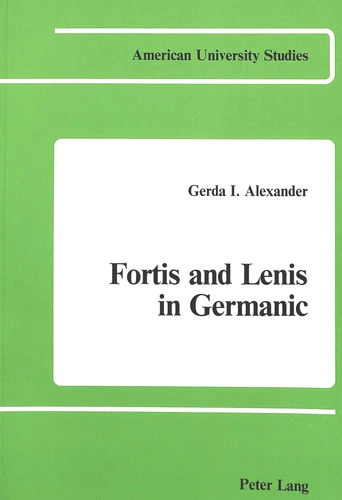Fortis and Lenis in Germanic
Par :Formats :
- Paiement en ligne :
- Livraison à domicile ou en point Mondial Relay indisponible
- Retrait Click and Collect en magasin gratuit
- Réservation en ligne avec paiement en magasin :
- Indisponible pour réserver et payer en magasin
- PrésentationBroché
- Poids0.332 kg
- Dimensions26,3 cm × 15,6 cm × 1,3 cm
- ISBN0-8204-0028-9
- EAN9780820400280
- Date de parution31/12/1983
- CollectionAmerican University Studies -
- ÉditeurAmerican University Studies - Se...
Résumé
This study represents a bold reanalysis of the phonemic system of Germanic consonants. The accepted primary voiced-voiceless phonemic contrast is replaced by fortis-lenis, whose origin is projected back into Proto-Germanic. It is proposed to view the Germanic consonant shift as the result of lenition in Gmc. /b d g f X s X/ and of strengthening of articulation in Gmc. /p t k/. Voice and spirantization are characteristic of the lenis members, whereas voicelessness and extraduration are characteristic of fortis.
This concept, backed by orthographic, comparative and acoustic phonetic data, supplies not only a simpler and more plausible development into the daughter languages, but also provides a common element in the explanation of the First and Second Sound Shift.
This concept, backed by orthographic, comparative and acoustic phonetic data, supplies not only a simpler and more plausible development into the daughter languages, but also provides a common element in the explanation of the First and Second Sound Shift.
This study represents a bold reanalysis of the phonemic system of Germanic consonants. The accepted primary voiced-voiceless phonemic contrast is replaced by fortis-lenis, whose origin is projected back into Proto-Germanic. It is proposed to view the Germanic consonant shift as the result of lenition in Gmc. /b d g f X s X/ and of strengthening of articulation in Gmc. /p t k/. Voice and spirantization are characteristic of the lenis members, whereas voicelessness and extraduration are characteristic of fortis.
This concept, backed by orthographic, comparative and acoustic phonetic data, supplies not only a simpler and more plausible development into the daughter languages, but also provides a common element in the explanation of the First and Second Sound Shift.
This concept, backed by orthographic, comparative and acoustic phonetic data, supplies not only a simpler and more plausible development into the daughter languages, but also provides a common element in the explanation of the First and Second Sound Shift.

